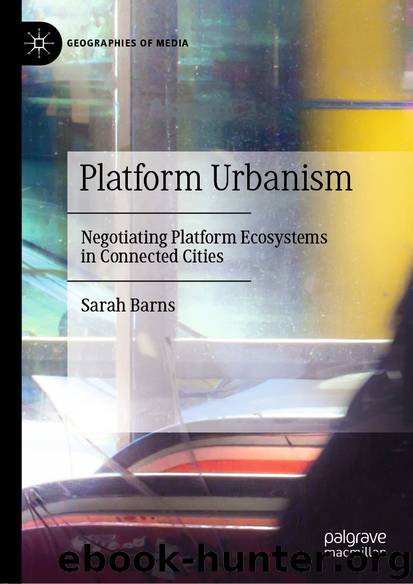Platform Urbanism by Sarah Barns

Author:Sarah Barns
Language: eng
Format: epub
ISBN: 9789813297258
Publisher: Springer Singapore
‘We are not in the business of building software, we are in the business of enabling interactions’ (Choudary 2015, emphasis added)
Just as newspapers gave their product away relatively cheaply, so companies such as Google and Facebook were seen to deliberately ‘open’ participation by globally networked users. Tactics to deepen engagement maximised the volume of ‘eyeballs’ on their platforms and in turn enhanced their capacity to coordinate, or intermediate, market-based transactions using their software platforms. As the cliché goes: ‘If you’re not paying for it, you’re the product’. In this context, maximising participation constitutes a kind of ‘steering tactic’ on the part of platforms, made manifest in free software for users (such as Google’s Gmail, and access to the Facebook network). It is also manifested in the provision of APIs, which allow software developers, acting as micro-entrepreneurs, to continue to expand the reach and capabilities of proprietary software for their own benefit, and those of their users. Understood not only as a technology strategy informing digital architecture, but as a corporate strategy or business model, the strategic execution of an API has acted as a central enabler of platform innovation. It is through the infrastructure of the API that a platform is able to shift or ‘steer’ the locus of innovation from within the firm to its external ecosystem. Empowering a platform ‘user’—whether a software developer, kindergarten teacher or music creator—to become a producer on a platform enables them to create additional value on the platform, which they personally benefit from. As platform economists would see it, this is the ‘positive externality’ of the multi-sided market in action. But platforms also primarily exist to ‘internalise’ these positive externalities, by charging commission and, as I will discuss shortly, through data agglomeration.
While platform business strategists were initially inspired by the success of digital software companies such as Apple and Google, it soon became clear that the integration of digital software via distributed sensors and ‘internet of things’ (IoT) applications provided a way for ambitious companies to essentially ‘platform’ a wider marketplace. Platforms like Uber, Didi and Airbnb have demonstrated the capacity for ‘platform-play’ digital services to create disruption in established industries like transportation and tourism. The growing ubiquity of the ‘internet of things’, facilitated by the use of distributed sensors, cloud storage and advanced analytics, has also provided ‘platform-play’ opportunities in more traditional infrastructural services such as water, utilities and banking services.3
More recently, companies such as WeWork and Katerra have shown how narratives of platform intermediation have aimed to intervene in the production of physical urban infrastructure—but not always successfully. WeWork was initially established as a business that provides co-working spaces, but in 2019 rebranded as ‘The We Company’ to extend its focus on a broader range of market opportunities, revolutionising ‘the way people and companies work’ according to the company tagline (Reisinger 2019). As a representative of the real estate industry in New York explained, this is a model that ultimately sought not only to attract tenants to co-working spaces, but also
Download
This site does not store any files on its server. We only index and link to content provided by other sites. Please contact the content providers to delete copyright contents if any and email us, we'll remove relevant links or contents immediately.
Kathy Andrews Collection by Kathy Andrews(11830)
The remains of the day by Kazuo Ishiguro(8997)
Spare by Prince Harry The Duke of Sussex(5194)
Paper Towns by Green John(5188)
The Body: A Guide for Occupants by Bill Bryson(5095)
Industrial Automation from Scratch: A hands-on guide to using sensors, actuators, PLCs, HMIs, and SCADA to automate industrial processes by Olushola Akande(5061)
Machine Learning at Scale with H2O by Gregory Keys | David Whiting(4312)
Be in a Treehouse by Pete Nelson(4051)
Never by Ken Follett(3953)
Harry Potter and the Goblet Of Fire by J.K. Rowling(3856)
Goodbye Paradise(3809)
The Remains of the Day by Kazuo Ishiguro(3408)
Into Thin Air by Jon Krakauer(3397)
Fairy Tale by Stephen King(3391)
The Cellar by Natasha Preston(3342)
The Genius of Japanese Carpentry by Azby Brown(3308)
120 Days of Sodom by Marquis de Sade(3273)
Reminders of Him: A Novel by Colleen Hoover(3115)
Drawing Shortcuts: Developing Quick Drawing Skills Using Today's Technology by Leggitt Jim(3080)
